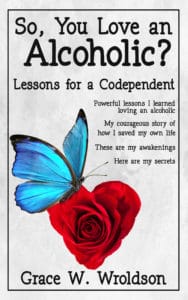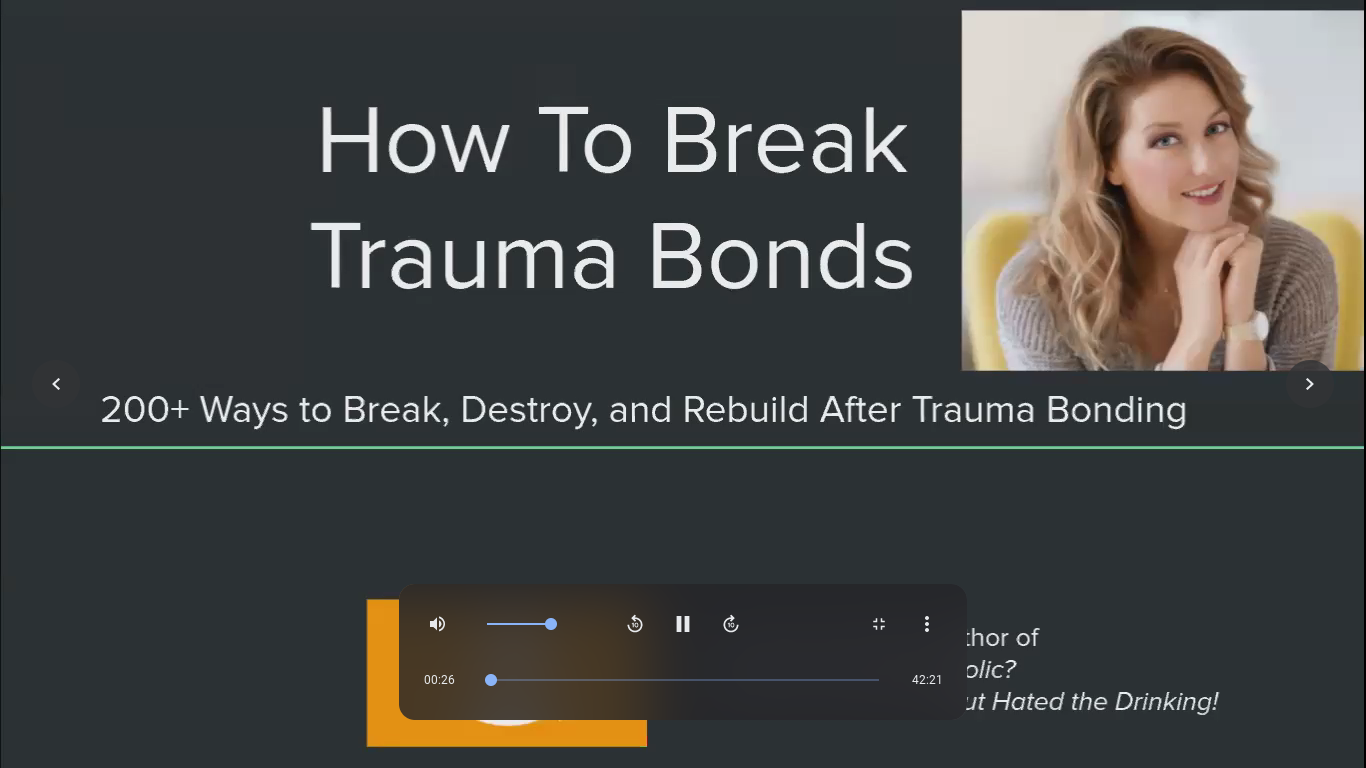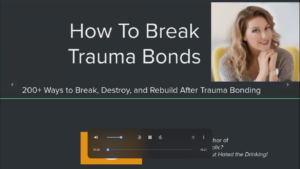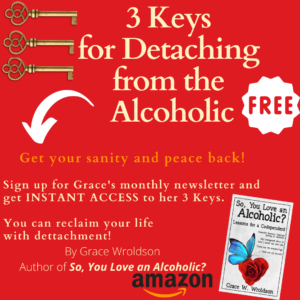Trauma Bonds:
200+ Tips/Ways To Break, Destroy, and Rebuild After Trauma Bonding
By Grace W. Wroldson, author of,
So, You Love an Alcoholic?: Lessons for a Codependent
Healing From Trauma Bonds
Trauma bonds are bonds formed by trauma —and they are strong! This type of bonding has both a biological and emotional component. So, these bonds don’t easily fade over time. You can’t fall out of trauma bonds like you “fall out of love.” Plus, it’s very difficult to stay away from someone you have bonded with. Even more so, the longer the time bonded, the harder it can be to break. These are a typical manifestation of an abusive relationship and relationships with alcoholics, addicts, or narcissists. Note: Some, if not most alcoholics have a narcissistic component and/or underlying personality disorder that often goes unrecognized. This can be due to the obvious effects of alcoholism and the visibility of alcohol use. It may be best for you to research narcissism, covert narcissism, or anti-social personality disorder because it may be something else you are contending with while being in a relationship with the alcoholic. This can bring new light to the problems and help you see more clearly the issues. From what I understand, while alcoholism can be arrested/treated, personality disorders have no cure and very limited, successful, long-term treatment outcomes. It’s important to be fully knowledgable about what you are dealing with and up against.
If you are recovering from codependency, overcoming love addiction, or attempting to release/break trauma bonds, you can use this list of ideas to help you break away and heal. You can start prioritizing your sanity and healing. With a recovery program, support, and these tips, you can learn to self-partner and become a generative source to yourself. So many women are curious about what a trauma bond is. Just by hearing the name of it, they instinctively know that they need to find a way (or ways) to break it. They have a gut feeling they are suffering from trauma bonds because the pull to the alcoholic relationship is so darn strong.
(Disclaimer: I am not a therapist nor a licensed mental health professional. These are not scientifically proven ways to break trauma bonds. Please get professional help for any mental health crisis. I am not liable for any injury, harm, or damage due to using these tips/ways. Please use these tips at your own risk. It’s encouraged that you get support from local crisis caseworkers to develop safety plans and have professional therapy to treat any conditions properly with clinical support.)

So, You Love an Alcoholic?: Lessons for a Codependent Buy Book on Amazon! Learn 25+ powerful lessons.
Trauma Bonds and Trauma Bombs
The relationship was complicated. The complexity often led me to so much confusion that I wasn’t sure what was happening or what to do. These are my wise words from the war front. Yes, my freedom from trauma bonds had to be fought for. It was a fight for my life, but a battle so worth it. My freedom from him took tremendous effort, planning, and execution. I even had to fight with myself. It felt like a ball of energy exploded every time I tried to make changes, chose something different, and said no to myself and him. It was like a bomb went off every time I dropped the simple word, “No.” This new, courageous choice started breaking the connection and the hold that codependency and unhealthy attachments had on me. I often needed help with every choice to step away, opt-out, and decline invitations to reconnect. I cried often, but my tears led me to transformation.
I won’t sugar coat this…it was incredibly hard to detach from the alcoholic/narcissist. I never knew why until I uncovered peptide addiction and the science of the highs we get from cortisol, adrenaline, dopamine, etc., and trauma bonds. Learning about trauma bonds set me free to begin targeted healing for this very specific hold the toxic relationship had on me. Please note that this is from my general understanding of trauma bonds. I have come to believe that these bonds reside in our subconscious, which is the body. So, I had to approach this healing endeavor both mentally and physically. I had to prepare for a marathon, and while I found temporary relief with suggestions, as there was no quick-fix that lasted. I had to be resilient and strong to outlast any cravings for connection. I got through it one day at a time, then one week at a time. These turned into successful months and years.
Be patient with yourself when breaking your habits and changing your patterns. It can be mentally, emotionally, psychologically, and physically exhausting due to the biological chemical functions involved. Bonds take time to break, just as they take time to form. Have hope, though, because the chemical components can be dealt with. Science has shown that we can have success. While you work on dealing with the physical withdrawal aspects, you can repair your thinking by recognizing that much of the intense pull was trauma, not love. You and only you can stop engaging in relationships that hurt you. Start loving yourself, and don’t accept less from others going forward.
Lacking Boundaries to Stay Connected Causes Trauma Bonds
Our innate empathy and understanding nature for them sits side-by-side with our abandonment of ourselves. We self-sacrifice to join with them, cutting off parts of our true selves in the process.
I didn’t realize how dangerous it was to lack boundaries. Sometimes, I purposely self-sabotaged to stay connected to him by not having solid boundaries in my sickness. My enmeshment with him was the breakdown of boundaries and the start of disrespecting myself and total self-sabotage. I allowed him to infiltrate my mind, heart, spirit, and soul.
To save myself, I had to create and enforce strong boundaries. Neither one of us liked this. It was painful. I had to grieve. I had to mourn. I had to remember my reasons. I had to recount my motives. I had to encourage myself. I had to get encouragement from others. I had to support myself. I had to get support from others. My boundaries began with having self-discipline and setting boundaries with myself.
Uncover the Origin of the Trauma Bond
Sometimes it’s helpful to realize we have been programmed, taught, and conditioned from childhood, which can predispose us to develop trauma bonds. However, if diving head-first into childhood trauma when dealing with current trauma is too much at once, don’t do it yet. Wait. Save this self-work for when you are stronger and more supported. When you are ready, you can investigate and come to understand how some trauma-bonding is a hangover from childhood. (That might be enough for you to process and understand for now.)
This phenomenon of toxic bonding is also a symptom of attachment injury from when we had to (for our survival) stay attached to an unavailable or abusive parent in the way that they deemed acceptable, because of our dependency on them to stay alive. We had to go into a type of amnesia about our hurts, needs and wants. We had to form these survival attachments to survive. That can often be the origin of our split (disconnection from feelings of self, wants, and needs).
This type of fragmentation is often involved, so after breaking off a trauma bond, we have to find ways to pull parts of ourselves back. There can be a real void. To help your understanding, find the terms and ideas that resonate with you. Each one of us had a different childhood, and each one of us will need to search for possible root causes and develop our own helpful solutions. That’s why this list has over 200 ways. Take what’s helpful and leave the rest for maybe later.
Research Trauma Bonds
Knowledge is power. If trauma bonds have power over you, then take your power back through education. Learn how a trauma bond is a trauma adaptation. Some say that it’s a terrifying unconscious pattern of fear of death projected onto our partners that we must become conscious of. Explore what a trauma bond means to you.
As fully-functioning adults with capabilities, rights, and resources, we are no longer dependent on others for our survival needs. We learn to start self-dependence. We are big now, and we won’t die if we are alone. Most of us don’t actually need a partner (situations vary). The idea that we need someone else to live can be an unconscious error in our thinking. A mistake. It’s okay if we make mistakes. We can learn from them. We can grow into better thinking.
Implement Strategies to Break Trauma Bonds
By implementing these strategies, I created distance from him and space for myself. I was able to breathe, think, reflect, and observe his patterns and my repeating, self-harming patterns. I was able to see how unhealthy our relationship had become and how toxic it was to me. I encourage you to step into self-work. Do what you can. A little can go a long way!
You can learn all my lessons in my book, So, You Love an Alcoholic?: Lessons for a Codependent, and my follow-up book, I Loved an Alcoholic But Hated the Drinking!
Helpful Suggestion:
Print this list out (in video description). Pick 10 things/ideas to do for yourself. Circle them. Come back to others once you have done 10, and do 10 more. There is so much self-work to do! It’s the most important work you will ever do!
KEY #1: What blows up a bond? A solid, strong boundary!
KEY #2: What will help you heal? Your own blend of physical and emotional healing methods. Different things work for different people. Make your own combination and discover what works for you!
Watch the video and get the full list in the video description. Click Here!
LINK: https://gracewroldson.gumroad.com/l/200waystobreaktraumabonds
—Grace Wroldson – mother, survivor, thriver, certified life coach, and author of 5 self-help books, which are available on Amazon
Grace loved an alcoholic for 15 years and tried everything to get him sober and save their relationship. She spent 20 years in Al-Anon and studied AA herself, hoping to help him. When loving him didn’t fix or save him, she instead had to fight to save herself and give herself a new life of sanity, peace, and freedom. With self-love, she enjoyed being single and raised a child safely outside of an alcoholic home. She regained self-respect and now helps women do the same.
3 Keys to Detaching from the Alcoholic!
Unlock your FREE PDF and INSTANT ACCESS!
Click HERE.




